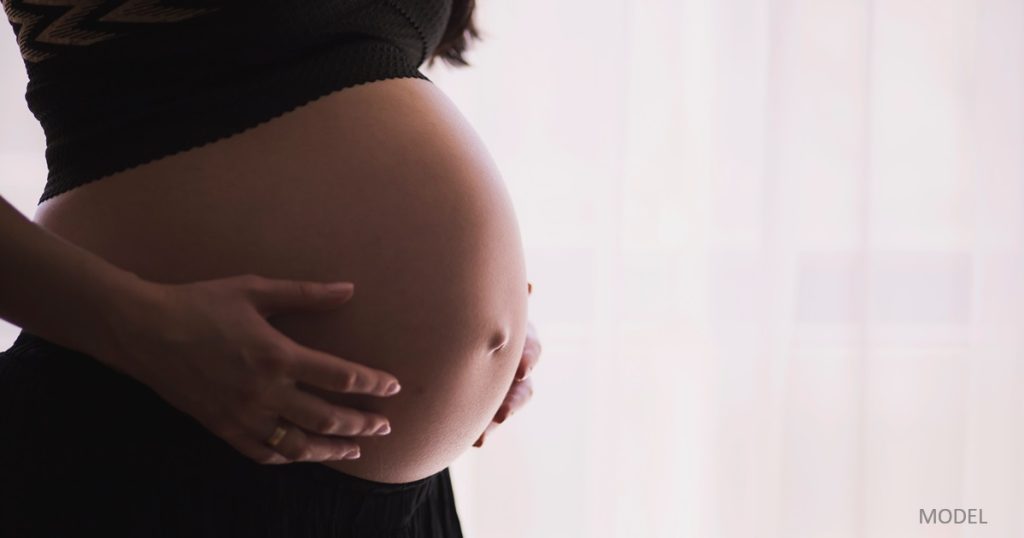Breast Health Before, During, and After Pregnancy
You should always take breast abnormalities seriously, but discovering a mass or lump in the breast during or immediately after pregnancy can be especially frightening.
Here are a few common questions answered about managing breast health before, during, and after pregnancy by our Beverly Hills breast cancer surgeons.
Can pregnancy cause fibroadenoma?
Fibroadenomas–noncancerous masses–are not uncommon in pregnant patients since fibroadenomas are associated with fluctuating hormones. They are not specifically caused by pregnancy. Fibroadenomas occur when tissues surrounding milk production glands grow connective tissues around a gland or glands, creating a mass or lump. It is not yet known exactly what causes fibroadenoma, but they are most often seen in younger women – between the ages of 17 and 35 – and their occurrence has been known to correspond with puberty and the use of birth control medication, in addition to pregnancy.
Does fibroadenoma affect pregnancy?
In most cases, fibroadenomas do not significantly affect pregnancy or pose any risks to the developing baby. However, there are a few factors to consider:
- Changes in size: Fibroadenomas may grow in size during pregnancy due to hormonal changes and increased blood flow to the breasts. This enlargement can cause discomfort or pain, especially if the fibroadenoma becomes large. However, most fibroadenomas do not grow large enough to cause complications.
- Breastfeeding: Fibroadenomas typically do not interfere with breastfeeding. The presence of a fibroadenoma does not necessarily affect milk production or the ability to breastfeed. However, if the fibroadenoma is large and causes discomfort, it may make breastfeeding more challenging.
- Monitoring: If you have a known fibroadenoma and become pregnant, your healthcare provider may recommend monitoring the fibroadenoma during and after pregnancy. This may involve regular breast exams and possibly imaging studies, such as ultrasound or mammogram, to ensure the fibroadenoma remains stable and does not show any concerning changes.
It’s important to note that every situation is unique, and the impact of fibroadenomas during pregnancy can vary. It is always advisable to consult with a breast specialist for personalized advice based on your specific circumstances. They can provide appropriate guidance and address any concerns you may have.
Should I have fibroadenomas removed during pregnancy?
Most surgeons don’t recommend surgical intervention for the removal of a fibroadenoma until after the pregnancy. However, unless the mass is atypically large, surgical removal may not be necessary at all. Many women find that fibroadenoma tumors dissolve on their own post-pregnancy. Your doctor may want to monitor the fibroadenoma to see if there are any changes.
Can you get breast cancer while pregnant?
Breast cancer can develop in pregnant and nursing women. Whether due to increased screenings, more vigilant medical care, or hyper-awareness of physical changes, breast cancer is among the most commonly detected forms of cancer in pregnant women.
Fortunately, cases of breast cancer developing during pregnancy are rare, and early detection and treatment very often lead to positive outcomes for the health of both mother and child.
Can pregnancy cause breast cancer?
Overall, while pregnancy itself does not cause breast cancer, there is a small risk of developing pregnancy-associated breast cancer (PABC). This is a rare form of breast cancer that can occur during or shortly after pregnancy. PABC refers to breast cancer that is diagnosed during pregnancy or within the first year after childbirth. It affects approximately 1 in 3,000 pregnancies. It’s important to maintain regular breast health checks and discuss any concerns with a healthcare professional.
Should breast cancer be treated during pregnancy?
When an abnormality is detected in the breast during a manual or self-examination, your physician may conduct a breast ultrasound to see if there are any signs of cancer. It is recommended that a pregnant woman should not undergo a mammogram until the first trimester has passed.
If malignant breast tissue is detected, it may be advisable to begin treatment immediately, though the health of the individual patient will dictate whether or not certain treatment options are advisable. While the presence of cancer in an expectant mother has not been shown to harm or affect the health and development of the fetus, some treatments might compromise the pregnancy.
Although it isn’t advised to begin radiation therapy until the pregnancy has progressed beyond the second trimester (it also shouldn’t be administered after the 35th week), surgical intervention may be performed without risking the health of the baby. Undergoing breast cancer treatment seems particularly frightening during pregnancy, but a strategic approach to treatment will help to ensure a good result.
Can pregnancy have health benefits for the breasts?
Pregnancy at a younger age, especially before the age of 30, has been found to have a protective effect against breast cancer. Women who have their first full-term pregnancy at a younger age have a reduced risk of developing breast cancer compared to those who have their first child later or never have children.
If you have concerns about an unidentified mass in your breasts, please don’t hesitate to call (310) 278-8590 or contact the team at Bedford Breast Center in Beverly Hills for an immediate screening.

